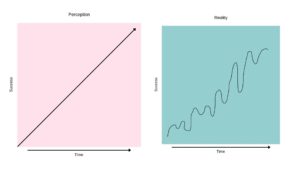Compounding (interest) isn’t the 8th wonder of the world. It’s not a wonder; it’s all around us available for everyone.
Those people we call overnight success stories. They became overnight successes by using the power of compounding for a long, long time.
But we don’t recognise this compounding effect because our minds are terrible at handling nonlinear equations. We generally default to seeing all outcomes as linear.
Think back to your high school mathematics days; linear simply means that two variables like x & y have a constant relationship. Here an increase in one variable produces a constant increase in another, like adding apples to a blender.
Non-linear relationships aren’t constant. For example, each time you add another apple to the blender, you produce a decreasing amount of juice.
We make the same mistake with hindsight. We say it’s 20/20, but it’s not.
My aging Nana with the macular disease had better vision than hindsight. We think it’s 20/20 because that’s how our minds like to work. We like to draw straight lines between actions and consequences, which is almost never true. Hindsight can turn a Picasso into a stick figure.
The Magic Of Compounding Is Not Obvious
Compounding is magic because we’re blind to its work. We don’t see the benefits of compounding, so we leave it on the table. Remember overnight success stories are never that.
James Clear, the author of atomic habits and the internet’s guide to self-improvement, has made a career out of teaching people how to apply compounding to their lives without ever naming it as such.
He uses the 1% rule to show his audience how powerful compounding is. The gist is this; if you improve at a skill by 1% each day, you will be 37x better than when you started by the end of the year. Is a 37x improvement in one year possible?
When I first read about the 1% rule, I thought it was silly. But again, our struggles with non-linear relationships hide how realistic this outcome is.
Remember those times in your life when you lost a competition and told yourself, ‘they’re not that much better than me’ ‘With a little practise I could beat them’. What if you re-matched them ten times and lost all 10. Are they still ‘not much better?
The game of chess disproves this ‘not much better’ fallacy.
Chess uses a rating system called ELO. Depending on your skill level, every player is assigned an ELO rating, usually between 0 – 3,000. You get matched with opponents based on your score, which creates a fair, competitive environment. When you win, your elo increases and visa-versa when you lose.
The ELO system is relative, i.e. it tells you via math how good or shit you are compared to everyone else playing chess. My rating is ~1050, which puts me in the top 25% of players on chess.com. A player rated 900 from memory sits in the top 35%, and a player rated 1200 would be close to the top 15%.
If I played that 900 rated person (only 10% worse than me), I’d beat them nine times out of 10. And If I played that 1200 rated player (only 10% better than me), I’d probably lose every game.
That 10%, not much better than me, player in both ELO and percentage terms, may be 10x better than me and feasibly years ahead of me in practice.
The gap between me and someone who consistently beats me in chess can be explained by compounding. Getting 1%, .5% or .25% better each day over 100’s of days leads to 10,20,50x improvements in a few years. By employing compounding, you can quickly progress from a bottom feeder to a world-beater.
I’m trying to show here that the gaps between you and the people a few steps ahead or behind at a given skill are not marginal, even though we often see it that way.
The ELO rating system of chess mimics with accuracy how our skill-sets are distributed across most verticals in this game of life we’re playing. We can use this to our advantage with compounding.
One year of practice feels like a long time when it’s laid out in front of you, but like a week when you look back.
The Best Are Rewarded Handsomely
All the fame, fortune, and opportunities of this world rise to the top—those with the highest ELO for their given pursuit. Society has never strayed from its loyal relationship with Pareto’s law.
The top-ranked boxer in each weight division takes home millions per fight. While the top 5 – 10 barely scratch $100k.
The top CEO’s take-home millions, while their direct reports and middle management are on salaries not much more than six figures.
We see this as inequality and unfairness created by a capitalist system, but it’s a natural phenomenon, not necessarily manufactured. In the animal kingdom, the strong survive and take all the rewards, while the weak die.
Take attractiveness, for example. Beauty is not engineered (yet). The most attractive humans enjoy a significantly larger pool of potential mating partners than the rest of us. That’s a lucky privilege that all the plastic surgery in the world can’t recreate.
Again those with the highest ELO earn outsized rewards, but the likely reason is not that they’re 10% or 20% better they’re likely 100+ x better.
Life is not fair; we all have unfair advantages. Whether it’s the country you were born in, your height or disposition to extroversion, and our unfair advantages can lead to unfair rewards.
Natural unfairness aside, for everything else, for overnight success, we can leverage compounding.
Getting Good Is Iterations
The mechanism behind compounding is iterations: lots and lots of them.
Don’t confuse iterations with time. That forever recited rule of 10,000 hours is misleading. Ten thousand hours, and I haven’t read the book, is likely just an average time input for people who become great. But that is all it is, a measurement. The true input is iterations.
Take learning an instrument, for example. Every time you attempt to play a note or a chord, you’re ingraining (hopefully good) habits, making minor improvements with every attempt. It takes you to try to play to learn to play. i.e. iterations.
Iterations take time to complete, but the argument that you make progress proportional to how much time you invest into improvement is not valid.
The Progress Roadblock
The most challenging part about getting good or becoming great is not the act but the lack of progress. Progress isn’t linear, even though we like to see it that way.
You can’t expect to be 1% better tomorrow because you played a chord 100 times today. You can conceivably practice for weeks and perform worse.

And while it’s not obvious that you’re improving, it’s never obvious that you’re improving unless you look back. That old saying comparing yourself to yesterday is helpful, but it needs an amendment to compare yourself to yesteryear.
I suspect frustration from lack of progress is the killer of many overnight success stories. Anytime I get stuck to the point of not being bothered to continue, I look back.
How To Become An Overnight Success Story
One of the world’s most sold novelists, Stephen King talks about this in his book ‘on writing’. After much begging, he brought his son a saxophone, and within months of his son’s first lesson, Stephen asked him to put it down for good. “I knew not because he’d stopped practising, but because he was practising only during the periods Mr. Bowie has set for him” Owen was a fast learner and practised a lot “nothing wrong with this memory, his lungs, or his eye-hand coordination” “but we never heard him try something new, blessing himself out.”
The day those lessons ended, so would have been Owens saxophone career – that’s when you know it’s not for you when you don’t do it for the love of it.
Investing is the common cold version of compounding. We all receive it to some degree, but the difference it makes to most of our lives is insignificant.
Other areas will give you way life-changing returns, and you need to play long-term games to maximise your benefits from compounding. The best-case scenario is you find games you want to play for life.
Building on Owen’s Saxophone experience, It seems that we need to find areas of life we enjoy & love that are energy giving rather than energy taking. Nothing that we consciously force ourselves to do, spend time with, and pay attention to is sustainable.
That’s the force I see behind the world’s best; they love what they do, they’re obsessed with what they do. To find these obsessions, just go wherever your curiosity leads you.
From my earliest memories, till I was ~21 years old, I believed my destiny was to be a pilot. I thought I was obsessed with flying. Until I got my commercial license and first hints of an aviation career, I realised it wasn’t for me. I don’t regret the experience and am glad I did it. I liked it but wasn’t obsessed, and my curiosities led me elsewhere.
You can’t sit back and wonder or pontificate what the right path is. That’s where dreams live and die. Just give things a crack. I would never have figured that flying wasn’t it for me if I didn’t give it a shot. Not doing is regret.
Do what you’re naturally curious about, and you’ll find your obsessions. The games you play for life will lead to exponential growth, opportunities and rewards. That’s how you become an overnight success.


Comments: 2
Pingbacks and Tracebacks
[…] Beast is another one of those overnight success stories ten years in the making. He started making Youtube videos at 13, has produced 1000’s since and […]
[…] Compounding returns. I might be flogging a dead horse here, but I’ll mention it anyway. […]